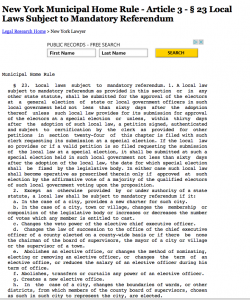By Rebecca Martin
In yesterday’s Daily Freeman, there was a report on the desire of Council members to have ‘Authority over City of Kingston’s Water Supply” that could be subject to public vote.
At a recent Public Safety/General Government committee meeting, Ward 5 Alderman and chair of the committee Bill Carey introduced a resolution to amend the City Charter. But City of Kingston Assistant Corporation Council Dan Gartenstein told the Committee that “they could not make the change through a resolution. He said the state’s Municipal Home Rule Law would require a public referendum be held because the council essentially would be expanding its powers.” Currently, the only public official who has any authority in the matter is the mayor, who sits on the city’s Board of Water Commissioners.
What we have learned over the past decade is that Government is more efficient when proper checks and balances are in place. In Kingston, one of the hardships of the Niagara Bottling project was the council not having a voice in the sale of an enormous amount of the community’s municipal water, leaving many questions in the way of science and modeling, climate change, safe yields, economic development and other critical aspects nearly impossible to challenge.
The Public Safety/General Government Committee was looking to explore an avenue that would include the Common Council in future certain sales of water. Given the time it would take to update the charter in its entirety (which we would advocate for) a simple amendment as we understand it would give the council – and in turn the citizens – a seat at the table as Involved for any large sales of water outside the City of Kingston.
The Steps
1. All that appears to be required that is most minimal, targeted and yet comprehensive would be to adopt a local law to amend Section C11-5C (Water Supply Outside of City) of the Charter in the following way (and only adding four words that are underlined below):
“C: Such sale or sales must be approved by the New York State Water Power and Control Commission (today is known as the DEC) and the Common Council.”
2. We found that based on Section 23 of the Municipal Home Rule Law (that list local laws requiring referendum) that it doesn’t appear that a local law passed by the Common Council to amend the Charter to provide for some form of Council approval of certain sales of water would be subject to a mandatory referendum. Section 23 of the Municipal Home Rule Law has the list of local laws requiring referendum, and we didn’t find anything close.
3. If this is correct, the Public Safety/General Government Committee could request that the Council adopt a local law that would amend the section. Once moved out of Committee, the Council would read the amended local law at their next meeting and vote the following month, giving the public 30 days in between for a chance to weigh in.
VIEW: Laws of 1896 and 1895:


It is curious that that the legislative branch in unable to legislate… but if a referendum is what is required, let us get on with that immediately!